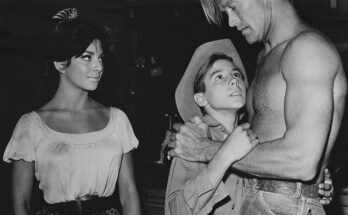From 1972 to 1978, Will Geer was known as the beloved grandpa on the wholesome family TV series The Waltons, but off screen, he lived a very different life.
The actor, who played Zeb Walton, was a member of The Communist Party and was also “madly in love” with a pioneer of gay rights, all while living under the guise of a happily married man.
Born in 1902, Indiana’s Will Greer, who played the lovable grandpa Zebulon “Zeb” on the family drama The Waltons, was in a relationship with a man, a pioneer of LGBTQ+ rights.
Harry Hay (1912 to 2012), who co-founded the first gay rights group in the U.S., is the man who quietly romanced the stage and film actor, who played Wyatt Earp in 1950’s western noir film Winchester ’73.
“In that time, you aren’t a gay person, you aren’t a homosexual person, you’re a degenerate,” said Hay, a former theatre actor who met a young Geer at Manhattan’s Tony Pastor Theater.
“In 1934, when I was, uh, working in the theater, I fell madly in love with the leading man whose name was Will Geer,” Hay said. “Uh, he was a man who eventually showed up in The Waltons and the various things you may know him by that…”
This was also the same year that Geer married Herta Ware. Before divorcing in 1954, the couple had three children, daughters Kate and Ellen, the latter also an actor, and son Thad.
Maintaining the image of a happily married man, the Gunsmoke actor raised his children through The Depression and his marriage did not exclude him from enjoying an affair with Hay.
According to Kenneth James Stump, the associate producer of The Jeffersons and Good Times, Geer was one of those “gays” who wanted kids and preferred “the other partner to be straight.”
It’s also suggested he kept his sexuality a secret from the public as the “Communist Party strictly prohibited homosexuals from joining.”
“We became lovers, and in the course of that, he was a member of the Communist Party and he recruited me,” Hay adds.
Blacklisted
Before appearing on the family drama The Waltons, Geer was an outspoken political activist and a member of the Communist Party in the 1930s and 1940s, an affiliation which landed him on Hollywood’s blacklist during the late 1940s and 1950s.
The blacklist was a result of the Red Scare (McCarthyism), where people suspected of having Communist ties were barred from working in Hollywood.
And Geer, despite denying connections with anything un-American, still found himself without work.
Comeback
Trying to keep himself busy, Geer, who held a master’s degree in botany from the University of Chicago, rediscovered horticulture.
“He was gardening like crazy, trying to feed the family,” says his oldest daughter, Ellen. “We lived off the land here. He was a survivalist.”
Refusing to abandon his love for acting, Geer organized outdoor plays on his Topanga Canyon plot, inviting other blacklisted artists, like Woodie Guthrie who openly described himself a communist, to perform.
Once concerns over the McCarthy era started to fade, Geer made his notable comeback in his Emmy Award winning role on The Waltons, a role he played from 1972 until his death in 1978.
“You get a certain age and people look on you as an oracle,” Geer said in The New York Times. “If you live long enough, everything could will happen to you, even a television series.”
‘I had him first’
After the Greer died, Grandpa Zeb, and the real-life actor, was mourned in The Empty Nest, the first episode of the next season (1978 to 1979).
At his funeral, according to the book Sexual Borderlands: Constructing of an American Sexual Past, Hay paid his respects to his former lover.
Meeting Geer’s ex-wife, Hay told her “I had him first,” and Herta responded, “I had him longest.”
At the time of his death, audiences had no idea what was going on in his personal life.
Explaining a possible reason for his secrecy in the book “Inside the Hollywood Closet,” one source offers: “The loyal viewership of that heart-warming TV series The Waltons would have had a collective seizure had it been widely known that grandpa…[was] queer in real life.”


